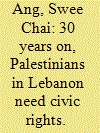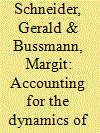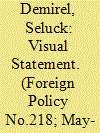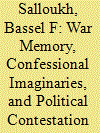| Srl | Item |
| 1 |
ID:
123256


|
|
|
| 2 |
ID:
124113


|
|
|
|
|
| Publication |
2013.
|
| Summary/Abstract |
This article presents the Konstanz One-Sided Violence Event Dataset (KOSVED) which allows researchers to study the dynamics of civilian abuse in 17 civil wars. The dataset provides, based on a multitude of sources, detailed information on the number of civilians killed or harmed by government or rebel troops. Where information is available, KOSVED also documents the dates of these events as well as the identities of the perpetrators and the means used in terrorizing the civilian population. The authors argue that the content analysis of news reports offers relatively accurate figures on those events that the perpetrators cannot hide from the public and that receive prominent media attention. Presumably, such information motivates potential short-term retaliatory acts by the group that has been the target of one-sided violence. The analysis suggests that, over the course of a conflict, almost all actors attack unarmed citizens, although to radically different degrees and relying on different means.
|
|
|
|
|
|
|
|
|
|
|
|
|
|
|
|
| 3 |
ID:
150404


|
|
|
| 4 |
ID:
167662


|
|
|
|
|
| Summary/Abstract |
How does sectarianism intersect with war memories to subvert the political balance of power in postwar Lebanon? This article examines this complex dynamic along two levels. On one level, it demonstrates how war memory is deployed selectively from above by members of the political elite to sabotage the national war memory sanctioned officially and corresponding to a particular postwar confessional balance of power. At another level is the confessional or sectarian use of memory to resist this postwar political balance of power perceived as unjustly tipped against the subnational community. The argument advances in two steps. I first examine how war memory is invoked during crucial political battles that impact the postwar confessional balance of power. I take the debate around the promulgation of a new electoral law, and the 2018 parliamentary elections, in the context of the regional repercussions of the explosion of the Islamic State in Iraq and Syria (ISIS) and the spillover effects of the Syrian war on Lebanon, as a case study of how different elites not only invoke war memories to contest or defend the postwar confessional balance of power but also to advance intra-sectarian political prerogatives. I then consider political memory as part of a complex and variegated confessional imaginary that survives at the private level in the form of resistance by substantial sectors of the Christian community to the postwar political balance of power and to the official national narrative of the war, one that refuses to revisit some of its most sordid moments, namely, its massacres. The article closes by underscoring the importance of reconciling dissonant memories of the war as a prerequisite for achieving genuine justice, peace, and reconciliation in postwar Lebanon.
|
|
|
|
|
|
|
|
|
|
|
|
|
|
|
|